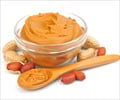Various forms of peanut flour has varying thickening capacity and this information is expected to help food experts to improve food textures
A new study conducted by New Agricultural Research Service (ARS) finds that various forms of peanut flour has varying thickening capacity and this information is expected to help food experts to improve food textures.
Peanut flour is obtained after partial extraction of oil from roasted peanut seeds. It is added to bakery products, nutrition bars and snacks, marinades, sauces and dressings to enhance flavor and protein value.Universally, peanut flour is used as a major food ingredient by industrial food processors.
During the study, researchers used different types of rheological tests to assess how effectively different brands of peanut flour thicken during heat processing.
Rheological measurements included testing the flow behavior and form changes of the material. Davis found that low-fat peanut flours produced more thickening effect than high-fat ones.
Peanut flour has double the percentage of protein than peanuts. This is because the mechanical process of removing fatty oil from roasted peanuts leaves the flour low in fat, high in protein and fairly low in carbohydrates.
Source-Medindia
PRI








